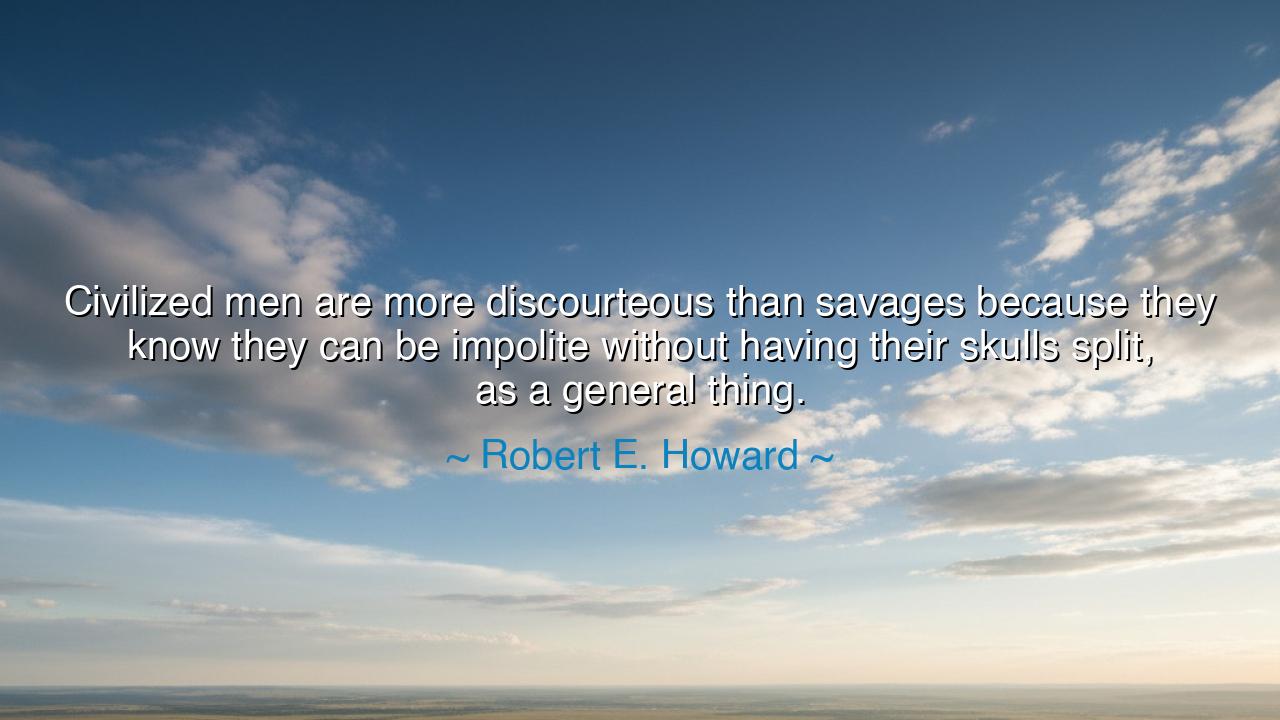
Civilized men are more discourteous than savages because they
Civilized men are more discourteous than savages because they know they can be impolite without having their skulls split, as a general thing.






"Civilized men are more discourteous than savages because they know they can be impolite without having their skulls split, as a general thing." These words, spoken by the writer and creator Robert E. Howard, challenge the very essence of civilization and manners. Howard, known for his heroic tales of Conan the Barbarian, suggests that the supposed advances of civilization—with its laws, rules, and social contracts—have bred a form of complacency and disrespect. Unlike the savages, whose survival often depended on mutual respect and strength, the "civilized" man has the luxury of impoliteness, knowing that the consequences of his actions are rarely so immediate or severe.
In the ancient world, societies built around tribal honor or tribal justice understood the direct consequences of one's actions. A person’s words or deeds were a reflection of their strength and honor, and disrespect often led to immediate retaliation. The ancient Greek and Roman cultures, with their emphasis on personal honor, placed great value on respect, particularly in their public life. Honor duels were not uncommon, and to insult someone was often to risk personal violence. Homer’s Iliad paints a vivid picture of this in its portrayal of heroes like Achilles and Hector, who were bound by codes of honor, and where one’s words were as powerful as their actions.
Yet, as civilization grew, so too did the distance between individuals and the harsh realities of survival. Roman law, though a monumental achievement in the history of governance, often served to buffer people from the immediate consequences of their words and deeds. The rise of bureaucracy, institutions, and state-sanctioned authority softened the brutal realities of life. No longer did individuals fear that their impolite or disrespectful behavior might cost them their life or their reputation. The rise of these protections created a space where manners could slip and courtesy could be treated as a mere formality, not a vital part of one's survival. In this world, Howard's observation rings true: the civilized man, knowing the security of his social contract, often lets his words run free without fear of direct consequences.
History, too, is filled with examples where civilization’s buffering influence has made people more prone to disrespect and impoliteness. The French Revolution, for instance, was a time when revolutionaries felt emboldened to tear down the old structures of power, but in doing so, they became more disrespectful and violent. The nobility was openly insulted, and the guillotine became a symbol of revolutionary justice. The social contract of France, already frayed, broke apart, and impoliteness escalated into brutality. The absence of immediate, personal retribution for one's words and actions led to a loss of the respect that had once been a cornerstone of medieval society.
However, Howard’s quote not only critiques the lack of immediate consequences in civilized societies, but it also calls us to remember the value of personal responsibility and respect. In a world where laws and institutions shield us from immediate harm, it is all too easy to forget that our words and actions still carry weight, even if the consequences are not as immediate or visible as a sword strike. Savages, or those in primitive societies, understood that words could be weapons, and respect was not merely a social nicety but a matter of survival. They knew that courtesy was not just an ornament, but the very glue that held the tribe together. In this light, the civilized man’s complacency—his disregard for the power of respect—becomes not a mark of freedom, but a weakness.
The lesson here is both a reminder and a call to action. It reminds us that while the safety provided by civilization may grant us freedom, it should not grant us the freedom to be impolite, disrespectful, or careless in our interactions with others. In fact, the more civilized we become, the more we should recognize the importance of personal responsibility in maintaining the social fabric of our communities. We must recognize that the cords of respect and honor, though less immediate than the sword’s edge, are just as important in maintaining the integrity of our societies.
Thus, in your own life, remember the power of words and respect. Be mindful of how you treat others, and recognize that the true mark of civilization is not just in the laws we create but in the respect we show each other daily. Let your words be as carefully chosen as your actions, for the strength of a civilized society rests on the respect of its people, not the ease with which they can act without fear of consequence. Be the one who upholds the values of honor and courtesy, for it is these virtues that truly define us as civilized beings.






AAdministratorAdministrator
Welcome, honored guests. Please leave a comment, we will respond soon